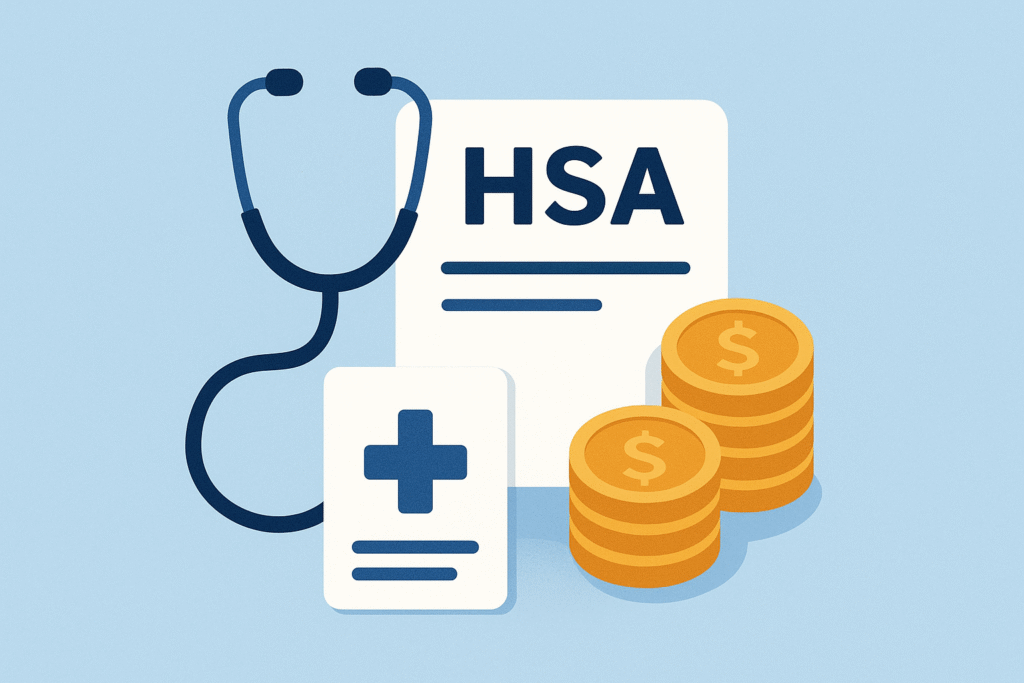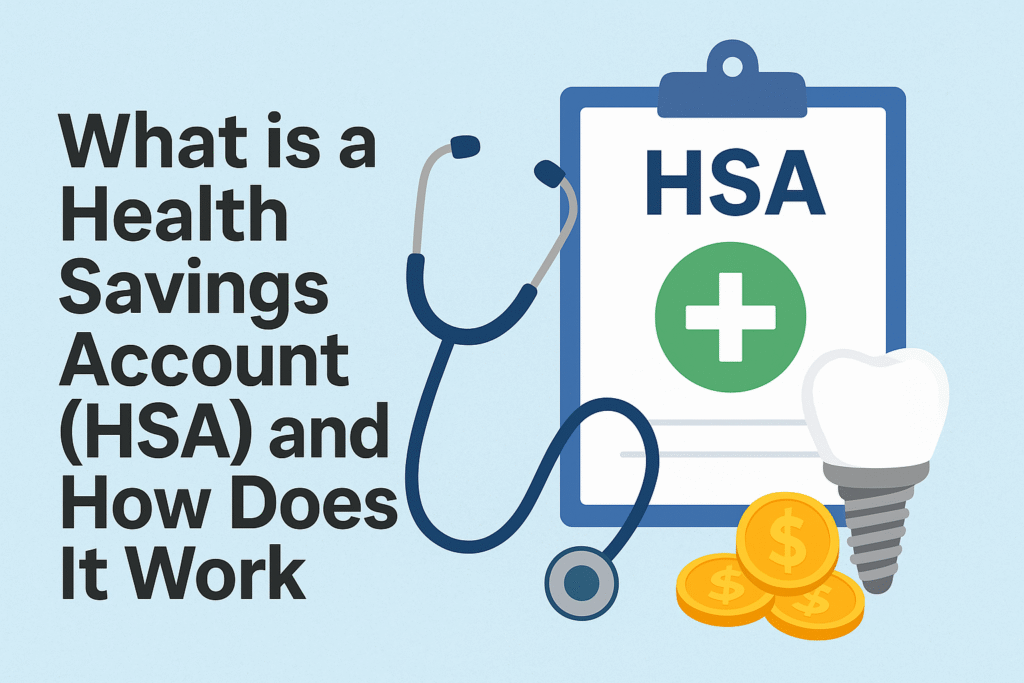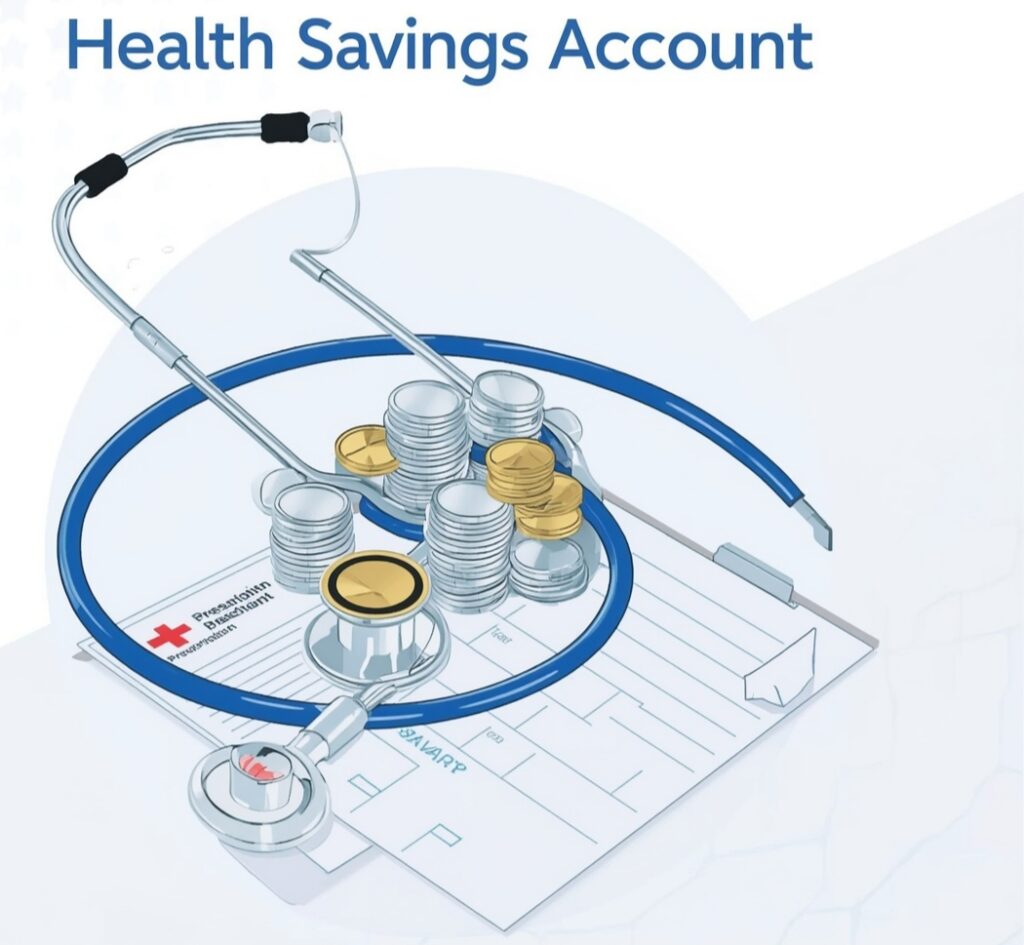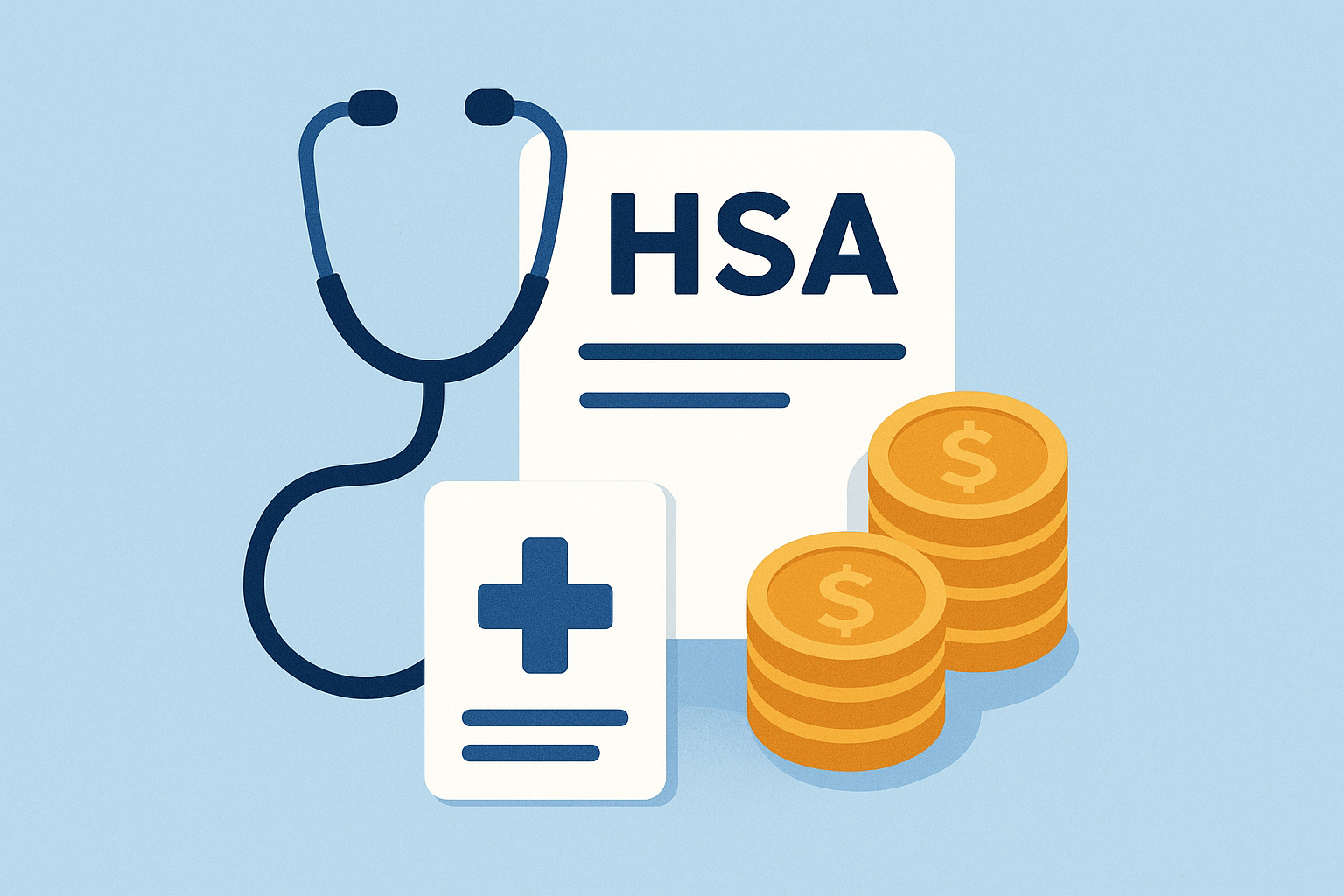
What is a Health Savings Account (HSA) and How Does It Work in 2025?
Healthcare costs in the United States are rising every year, and millions of Americans are looking for smarter ways to save money while staying financially secure. One of the most powerful tools available is the Health Savings Account (HSA). But what exactly is an HSA, how does it work, and is it the right choice for you in 2025?
This guide will explain everything you need to know about HSAs—eligibility, benefits, contribution limits, and how you can use them to save thousands in taxes.

What is Health Savings Account (HSA)?
A Health Savings Account (HSA) is a tax-advantaged savings account that allows you to set aside pre-tax money specifically for qualified medical expenses.
It was created by the U.S. government to help people with High-Deductible Health Plans (HDHPs) manage their out-of-pocket healthcare costs.
- Money you put into an HSA is not taxed.
- It grows tax-free if you invest it.
- Withdrawals for medical expenses are also tax-free.
This is often called the “triple tax advantage”, making HSA one of the most powerful financial tools available to Americans.
How Does an HSA Work?
An HSA works like a personal savings account but with unique tax benefits:
- Contributions – You can deposit money into your HSA from your paycheck (pre-tax) or directly after-tax (and then deduct it when filing taxes).
- Growth – Money in your HSA can earn interest, and many providers allow you to invest it in mutual funds, ETFs, or stocks.
- Withdrawals – When you use the money for eligible medical expenses, you pay no taxes at all.
If you spend HSA funds on non-medical expenses before age 65, you’ll pay taxes plus a 20% penalty. After age 65, you can withdraw money for any purpose (like a retirement account), but non-medical withdrawals will be taxed as regular income.
Who is Eligible for an HSA in 2025?
Not everyone can open an HSA. To qualify:
- You must be enrolled in a High-Deductible Health Plan (HDHP).
- You cannot be covered by another non-HDHP insurance.
- You cannot be enrolled in Medicare.
- You cannot be claimed as a dependent on someone else’s tax return.
This ensures HSAs are used by individuals who need help covering higher out-of-pocket expenses.

Key Benefits of an HSA
HSAs offer unique advantages that make them more powerful than regular savings accounts:
- Triple Tax Benefit: Contributions are pre-tax, money grows tax-free, and qualified withdrawals are tax-free.
- Portability: Your HSA belongs to you, not your employer. You can take it with you if you change jobs.
- Long-Term Savings: HSAs can double as retirement accounts because unused funds roll over year after year.
- Flexibility: Use the money for a wide range of medical expenses—from doctor visits to prescriptions, dental care, and vision correction.
HSA Contribution Limits 2025 (IRS Updated)
Each year, the IRS sets contribution limits. For 2025, the limits are:
| Type | Contribution Limit |
|---|---|
| Individual Coverage | $4,300 |
| Family Coverage | $8,550 |
| Catch-up (Age 55+) | +$1,000 extra |
👉 These limits mean you can save significantly on taxes while building a health-focused financial safety net.
What Can You Use an HSA For?
HSA funds can be used for a wide range of qualified medical expenses, including:
- Doctor visits and co-pays
- Prescription medications
- Dental treatments (cleanings, fillings, braces, implants)
- Vision care (eye exams, glasses, LASIK surgery)
- Mental health therapy
- Certain over-the-counter drugs (as approved by IRS rules)
For a complete list, you can check IRS Publication 502.
What Happens to Unused HSA Money?
Unlike Flexible Spending Accounts (FSAs), HSA funds never expire.
- Rollover: Unused money rolls over year to year.
- Growth: The balance can be invested, allowing your HSA to grow like a retirement account.
- Retirement Use: After age 65, you can use the funds for any expense (not just medical) without penalties, though non-medical withdrawals will be taxed as income.
This makes HSAs a smart long-term financial tool.
Pros and Cons of HSA
| Pros | Cons |
|---|---|
| Triple tax benefits | Requires HDHP enrollment |
| Funds roll over year to year | High out-of-pocket costs with HDHP |
| Portable, belongs to you | Penalties for non-qualified use before 65 |
| Can be invested for growth | Contribution limits apply |
Step-by-Step Guide to Opening an HSA in 2025
Getting started with an HSA is simple:
- Enroll in an HDHP – Check if your employer or marketplace plan qualifies.
- Choose an HSA provider – Options include banks, credit unions, and investment firms.
- Open the account – Usually online, with minimal paperwork.
- Fund your HSA – Through payroll deductions or direct contributions.
- Use it wisely – Pay medical expenses using your HSA debit card, or let the money grow.
🟢 Different Types of HSAs Explained
Not all Health Savings Accounts are the same. Depending on your situation, you may open or use an HSA in different ways. Here are the main types:
- Individual HSA
- Designed for people who have an HDHP (High-Deductible Health Plan) with self-only coverage.
- Contribution limits are lower compared to family HSAs (for 2025, $4,300).
- Best option for young professionals or single adults who want to save money on taxes while preparing for medical costs.
- Family HSA
- Covers the account holder, spouse, and dependents under one HDHP plan.
- The contribution limit is higher (for 2025, $8,550).
- Allows families to save more money and use the funds for multiple members’ healthcare needs such as dental, vision, or prescriptions.
- Employer-Sponsored HSA
- Many U.S. companies offer HSAs alongside HDHPs.
- Employers may contribute to your account as part of your benefits package.
- Some even provide investment options and lower fees compared to opening an HSA individually at a bank.
👉 Choosing the right type of HSA depends on whether you’re single, supporting a family, or using an employer’s benefits.
🟢 Real-Life Scenarios & Examples
To better understand how HSAs work, let’s look at some practical examples:
- Example 1: Sarah’s Dental Implants
Sarah, a 35-year-old professional, has an HDHP and contributes $3,000 annually to her HSA. When she needed dental implants costing $4,500, she used her HSA funds to cover $3,000. Because the contribution was tax-free, she saved nearly $700 in taxes. The remaining $1,500 she paid out-of-pocket, but the HSA still reduced her overall financial burden. - Example 2: John’s Retirement Savings Strategy
John, age 50, contributes the maximum to his family HSA every year and invests a portion of it in index funds. Over 10 years, his HSA grew significantly. When he needed surgery at age 60, he used tax-free HSA withdrawals for hospital bills while his investments continued to grow for retirement. - Example 3: Mark’s Mistake
Mark used his HSA to pay for a gym membership, thinking it was an eligible expense. Unfortunately, it was not. When filing taxes, he faced a 20% penalty plus income tax on that withdrawal. This shows why it’s critical to understand eligible expenses before using your HSA funds.
👉 These scenarios highlight that HSAs can be extremely valuable if used correctly—but misuse can lead to costly penalties.

🟦 Comparison Table: HSA vs FSA vs Traditional Savings
| Feature | HSA (Health Savings Account) | FSA (Flexible Spending Account) | Traditional Savings |
|---|---|---|---|
| Eligibility | Must be enrolled in a High Deductible Health Plan (HDHP) | Available through employers, no HDHP required | Anyone can open |
| Contributions | Pre-tax, lowers taxable income | Pre-tax, lowers taxable income | After-tax (no tax benefits) |
| Annual Limit (2025) | $4,300 (individual), $8,600 (family) + $1,000 catch-up (55+) | $3,200 approx. (employer-set limits may vary) | No limit |
| Rollover | Funds roll over year to year | “Use it or lose it” (limited rollover allowed) | Always rolls over |
| Investment Options | Can invest in stocks, bonds, mutual funds | No investment options | Can invest, but not tax-advantaged |
| Withdrawals | Tax-free for qualified medical expenses | Tax-free for qualified medical expenses | Taxable withdrawals |
| Portability | Account stays with you even if you change jobs | Tied to employer | Always yours |
| Best For | Long-term medical savings & retirement healthcare planning | Short-term healthcare expenses | General savings, non-medical |
FAQs About HSA
Is an HSA worth it in 2025?
Yes, especially if you want to save on taxes and prepare for future medical or retirement expenses.
What happens to my HSA if I switch jobs?
It stays with you—it’s portable.
Can I invest HSA money in stocks?
Yes, many providers allow investments after reaching a certain balance.
Is HSA better than FSA?
Yes, because funds roll over and HSAs offer investment options, unlike FSAs.
Conclusion
A Health Savings Account (HSA) is more than just a medical expense account—it’s a powerful financial tool with long-term benefits. By understanding how HSAs work, contribution limits, and eligible expenses, you can save thousands on taxes while securing your healthcare future.
If you’re looking to reduce healthcare costs and build a tax-advantaged savings plan in 2025, opening an HSA could be one of the smartest financial decisions you make.
👉 Next, explore our detailed guide on “Can I Use My HSA for Dental Implants?” to see how HSAs can cover major healthcare expenses.
If you want to know more about how HSAs cover dental procedures, check out our guide on Can I Use My HSA for Dental Implants in America 2025?.
- IRS official page about HSAs
👉 https://www.irs.gov/publications/p969 - HealthCare.gov – HSAs explained
👉 https://www.healthcare.gov/glossary/health-savings-account-HSA/ - Investopedia HSA Guide (trusted financial source)
👉 https://www.investopedia.com/terms/h/hsa.asp

